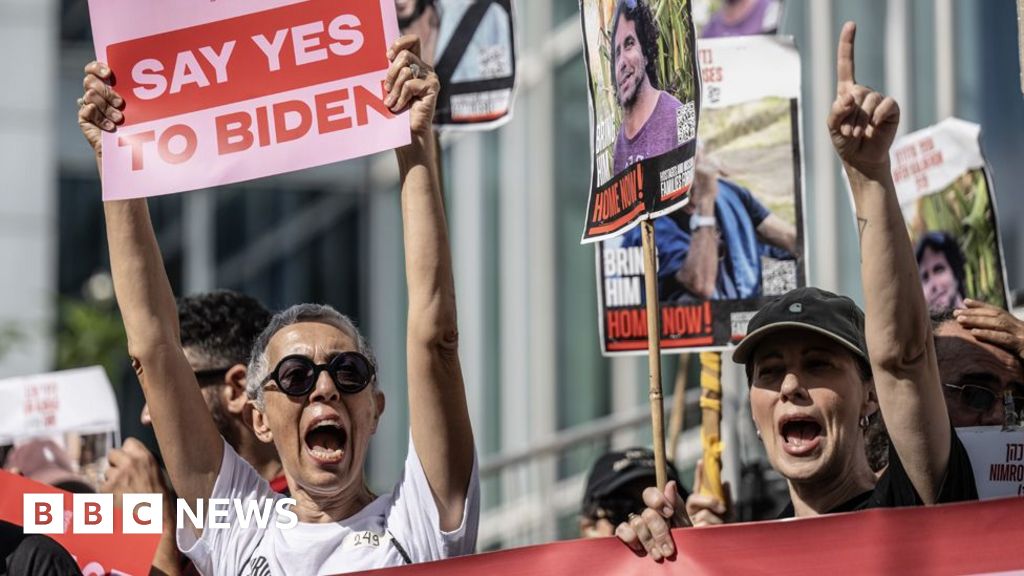US Secretary of State Antony Blinken has said Israeli Prime Minister Benjamin Netanyahu has “reaffirmed his commitment” to a Gaza ceasefire plan, and that if it does not progress Hamas will be to blame.
Mr Blinken reiterated his call for Hamas to accept the plan as outlined by President Biden 11 days ago. He was speaking a day after holding talks with Mr Netanyahu in Jerusalem.
He said the onus was on “one guy” hiding “ten storeys underground in Gaza” to make the casting vote, referring to Hamas leader Yahya Sinwar.
Mr Netanyahu has not publicly endorsed what Mr Biden outlined nor said whether it matches an Israeli ceasefire proposal on which Mr Biden’s statement was based.
Mr Blinken described as a “hopeful sign” Hamas’s response to a resolution passed by the UN Security Council on Monday supporting what Mr Biden had announced.
The resolution noted that Israel had accepted what Mr Biden had presented and called on Hamas to do so as well.
Hamas issued a statement on Tuesday welcoming “what was included” in the resolution.
But Mr Blinken said Hamas’s response was not conclusive, adding that that “what counts” is what is said by the Hamas leadership in Gaza, “and that’s what we don’t have”.
If the proposal did not proceed then it was “on them”, he said.
After months of stuttering ceasefire talks behind closed doors, Mr Biden publicly announced last month what he said was an Israeli “roadmap to an enduring ceasefire and the release of all hostages” which he then went on to outline.
The proposal involves an initial six week ceasefire with Hamas releasing some hostages in exchange for Israel releasing an undefined number of Palestinian prisoners.
A second phase would see the remaining hostages released by Hamas and a total withdrawal of Israeli forces from Gaza as part of a “permanent” ceasefire, but the latter would still be subject to negotiations.
Mr Blinken’s trip is part of an intense diplomatic effort by the US to try to push the sides into making progress on the proposal, but clinching an agreement faces major obstacles.
Mr Netanyahu has acknowledged his war cabinet has authorised the plan but has not voiced unequivocally support for it. Far-right members of his cabinet have threatened to quit his coalition and trigger its collapse if the deal goes forward, seeing it as surrender to Hamas.
Meanwhile, Hamas is likely to seek clear guarantees that the proposal would lead to the complete withdrawal of Israeli forces and a permanent end to the war.
So far, it has yet to formally respond to the plan.
The actual Israeli proposal – reportedly lengthier than the summary presented by Mr Biden – has not been made public and it is unclear whether it varies from what the president conveyed in his statement on 31 May. It was presented to Hamas days prior to Mr Biden’s speech.
The Israeli proposal was agreed upon by Israel’s three-man war cabinet and has not been disclosed to the wider government. Some far-right ministers have already made clear they oppose it.
The Biden administration is trying to leverage popular pressure as part of its campaign to bounce the sides into progress on the proposal.
As Mr Blinken met Israeli officials in Tel Aviv on Tuesday, protesters outside his hotel held American flags calling for an agreement. Many held pictures of hostages and chanted: “SOS, USA”, and “we trust you, Blinken, seal a deal”.
Vicki Cohen, the mother of Nimrod Cohen, 19, an Israeli soldier who was kidnapped by Hamas on 7 October, held a banner showing his picture.
She told the BBC: “We come here to ask Blinken and the USA government to help us, to save us from our government. Our prime minister doesn’t want to bring our loved ones back, we need their help to pressure our government.”
Mr Blinken later spoke with Ms Cohen and other families of hostages, including Americans, during a brief interaction with them outside the hotel.
“You’re going to be here every day, we’re going to be here every day,” he told them.
The secretary of state continued the whirlwind diplomatic visit, flying by US military plane to the Jordanian capital, Amman, and from there by helicopter to the Dead Sea for a conference of Arab leaders calling for greater aid access into war-ravaged Gaza.
The ride involved five Jordanian air force helicopters carrying Mr Blinken, his officials and the BBC among the travelling press pool. The fleet headed west, flying low, to the town of Swemeh on the shores of the Dead Sea, sitting directly across the water from the occupied West Bank.
In a speech at the conference, Mr Blinken said that Israel had taken “some important steps” to ensure aid was delivered into Gaza, but he insisted that it “can and must do more”.
He also announced $404 million in new aid for Palestinians, urging other countries to also “step up” assistance.
“The horror must stop,” UN Secretary General Antonio Guterres told the conference. “The speed and scale of the carnage and killing in Gaza is beyond anything in my years as secretary general,” he said.
UN humanitarian coordination chief Martin Griffiths described the Gaza war as a “stain on our humanity” and appealed for $2.5 billion to meet the humanitarian needs of Palestinians in Gaza from April until December.
The war began after Hamas attacked Israel on 7 October, killing about 1,200 people and taking 251 others back to Gaza as hostages. The Hamas-run health ministry in Gaza says more than 37,000 people have been killed in the Israeli offensive since then.

